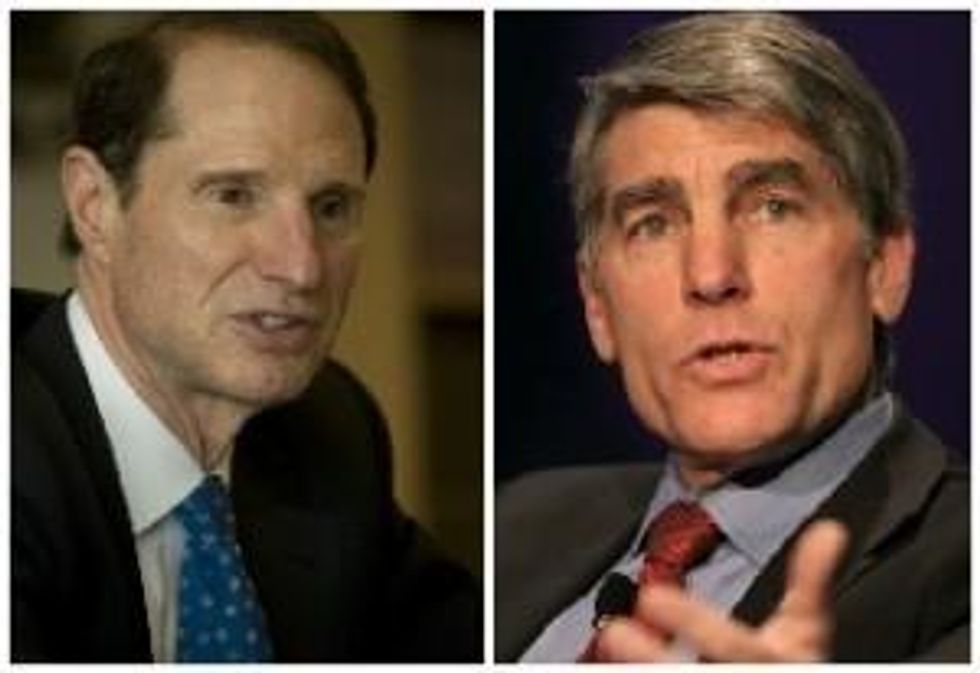For years, Senators Ron Wyden and Mark Udall issued warnings about the government's "secret" interpretation of the Patriot Act - an overbroad interpretation we now know led to the NSA's collection of millions of innocent Americans' phone records.
Because they sit on the Senate Intelligence Committee, Wyden and Udall have special knowledge of the classified records collection program but are limited in what they can publicly say about it. This hasn't prevented the senators from raising veiled concerns.
For example, in 2011 Wyden predicted from the Senate floor, "When the American people find out how their government has secretly interpreted the Patriot Act, they will be stunned and they will be angry."
The reaction to the program has in large part shown this to be correct and validated the concerns raised by the two senators. Given their track record, it's worth paying close attention when Wyden and Udall speak about the NSA.
Recently, the two senators engaged in a public exchange with Director of National Intelligence James Clapper about the records collection program.
In June, a group of senators, including Wyden and Udall, sent a letter to Clapper with specific concerns about the program. Clapper responded with his own letter, which was accompanied by a classified annex. Wyden and Udall then issued a response statement. Below are three key takeaways from the public exchange.
Effectiveness
In their initial letter, the senators presented a series of questions and requests for information pertaining to the effectiveness and scope of the records collection program. This included a request for Clapper to,
Identify any specific examples of instances in which intelligence gained by reviewing phone records obtained through Section 215 [of the Patriot Act] bulk collection proved useful in thwarting a particular terrorist plot.
And,
Provide specific examples of instances in which useful intelligence was gained by reviewing phone records that could not have been obtained without the bulk collection authority.
In his response, Clapper stated,
We have previously declassified two instances where the Section 215 bulk collection was useful: the attempt by Najibullah Zazi to bomb the New York subway system, and the material support investigation of Basaaly Moalim. Other examples... are provided in the classified supplement.
In their response, Wyden and Udall wrote,
Intelligence leaders were specifically asked to demonstrate the unique value of the bulk phone records collection program. They did not. Instead, they persist in citing two cases where the government could have obtained a court order or emergency authorization for the information it needed.
Key takeaway: The unique value of the program has not been demonstrated.
Location Tracking
The initial letter from the senators asked,
Has the NSA collected or made any plans to collect Americans' cell-site location data in bulk?
Clapper responded,
Under this program NSA is not currently receiving cell site location data, and has no current plans to do so. The Director of NSA indicated... he would notify Congress of NSA's intent to obtain cell site location data prior to any such plans being put in place.
In their response, Wyden and Udall wrote,
It's also deeply troubling that while the NSA claims no current plans to turn Americans' cell phones into tracking devices, it clearly claims the authority to do so.
Key takeaway: The NSA could collect Americans' location data in bulk under the government's interpretation of the Patriot Act.
"Secret Interpretation"
The initial letter from the senators noted that,
The executive branch acknowledged for the first time that the "business records" provision of the USA PATRIOT Act has been secretly reinterpreted...
Clapper responded that it was "not correct" to say the act had been secretly reinterpreted; Wyden and Udall replied,
We are amazed that intelligence leaders deny that the PATRIOT Act has been 'secretly reinterpreted' when it is obvious that most Americans and many members of Congress had no idea that this law could be used for bulk collection of millions of law-abiding Americans' personal records.
Also pertinent here is an op-ed by Rep. Jim Sensenbrenner, written days after the initial revelation about the program. In it, Sensenbrenner, an original architect of the Patriot Act who has said the records collection program is an abuse of that law, wrote,
While some members of Congress were briefed [on this program] - particularly those on the intelligence committees - most, including myself, were not.
Key takeaway: According to Members themselves, not everyone in Congress was aware of the phone records collection.
Conclusion
At a Senate Intelligence hearing in March, Wyden asked Clapper, "Does the NSA collect any type of data at all on millions or hundreds of millions of Americans?" Clapper responded, "No, sir." (Clapper later admitted in a letter to Intel Committee Chair Dianne Feinstein that his answer was "clearly erroneous," and he had mistakenly been referring to a different program.)
Wyden of course knew of the bulk phone records collection program and was troubled by its scope, which is why he put this particular question to the Director. The episode illustrates that, although Wyden and Udall are legally restrained in what they can say, the two senators are raising informed questions and concerns about the NSA program. It's up to the public to pay close attention.

